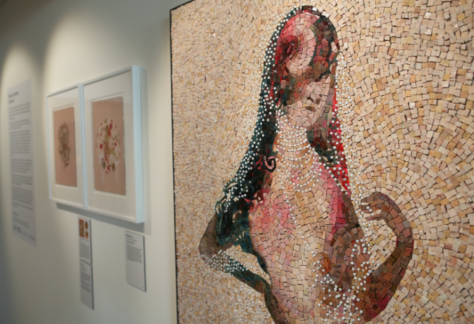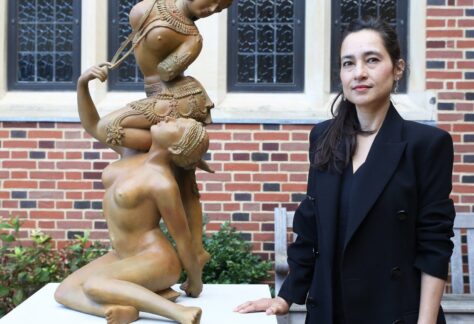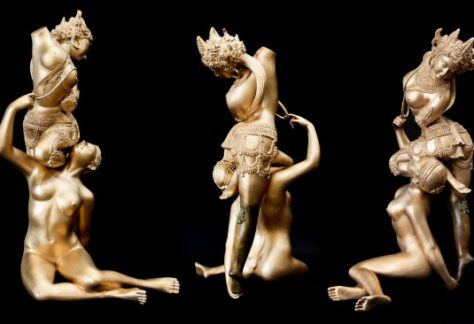15 October 2021 – 18 February 2022
Jesus College, Cambridge
This exhibition, Shahzia Sikander: Unbound, brings the work of Pakistani-American contemporary artist Shahzia Sikander to a lively, community-facing debate on issues of globalism, decolonisation, and the restitution of colonial loot. It involves the first-ever outdoor installation of one of Sikander’s sculptures on the grounds of a world-renowned space for showing public sculpture, Jesus College. In addition to an exhibition installed at Jesus College’s West Court Gallery featuring 20 objects: drawings, paintings, mosaic, there is also a public symposium in February 2022 which opens the practice of Shahzia Sikander up to multiple voices from South Asian art, Islamic art, and modern and contemporary art.
By experimenting with classical Persian and Indian painting, Sikander has unbound “miniature” forms from premodern illustrated manuscripts to large-scale drawings, animation, glass mosaic, and most recently, sculpture. As a recipient of several accolades including the Medal of Arts from the United States and the National Medal of Honour from Pakistan, Sikander has established herself as an interpreter of multiple past traditions for today’s globalised world.
The exhibition is accompanied by a scholarly symposium at Jesus College, which will be open to the public on 11–12 February 2022.
In coordination with the Works of Art Committee, the exhibition is organised by Dr Vivek Gupta, College Postdoctoral Associate at Jesus College and Postdoctoral Associate in Islamic Art at the Centre of Islamic Studies (2020-23). The exhibition is also supported by Sean Kelly Gallery in New York, Pilar Corrias Gallery in London, and The Prince Alwaleed bin Talal Centre of Islamic Studies at Cambridge. The symposium includes colleagues from Kettle’s Yard, History of Art at Cambridge, and the Tate Modern, London.
Check our Events page for further details on the exhibition and public symposium.
About Shahzia Sikander
Pioneering Pakistani American, Shahzia Sikander, is widely celebrated for expanding and subverting pre-modern and classical Central and South-Asian miniature painting traditions and launching the form known today as neo-miniature. By bringing traditional and historical practice into dialogue with contemporary international art practices, Sikander’s multivalent and investigative work examines colonial archives to readdress orientalist narratives in western art history. Interrogating ideas of language, trade, empire, and migration through imperial and feminist perspectives Sikander’s paintings, video animations, mosaics and sculpture explore gender roles and sexuality, cultural identity, racial narratives, and colonial and postcolonial histories.
Sikander earned a B.F.A. in 1991 from the National College of Arts in Lahore, Pakistan. Her seminal thesis work, The Scroll (1989–1990), which initiated the start of the neo-miniature movement, garnered awards, exhibitions and press, and led to increased enrollment in the NCA’s miniature painting department. Subsequently, Sikander was appointed lecturer in miniature painting at the school. The artist moved to the United States to pursue an M.F.A. at the Rhode Island School of Design from 1993 to 1995; from 1995 to 1997, she participated in the Glassell School of Art’s CORE Program at The Museum of Fine Arts, Houston. A recipient of a MacArthur Fellowship (2006) and the State Department Medal of Arts (2012), Sikander’s innovative work has been exhibited and collected internationally. Read her full bio and find out more on her website here.
Organiser’s bio
The exhibition is supported by the Prince Alwaleed bin Talal Centre of Islamic Studies, University of Cambridge, the Pilar Corrias Gallery and the Bagri Foundation, London. It is curated by Dr Vivek Gupta, Postdoctoral Associate in Islamic Art at the Jesus College Cambridge, with the assistance of History of Art students.




